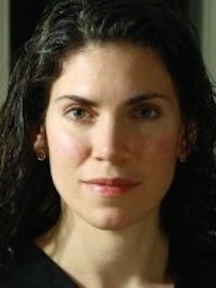By Benjamin Sonnenberg
Jamille Bigio graduated Phi Beta Kappa from the University of Maryland, College Park with a BA in International Public Health in 2004. She attended Harvard’s John F. Kennedy School of Government in 2007, where she received an MPP in Political and Economic Development. Bigio has worked with the UN Office for the Coordination of Humanitarian Affairs; has served as a policy adviser for the UN Assistance Mission for Iraq; and has been an adviser for The World Bank, The Brookings Institute, and the United States Department of Defense.
Currently, Bigio is an adjunct senior fellow in the Women and Foreign Policy Program at the Council on Foreign Relations (CFR), a nonpartisan think tank devoted to international affairs. She helps to conduct research focused on the relationship between gender and security, women’s leadership, and state-building. She has received the US Department of State’s Superior Honor Award twice, the Franklin Award, and numerous other accolades.
Bigio is also a prolific author with numerous articles to her credit and maintains a blog where she frequently discusses topics ranging from women’s role in counter-terrorism to their relationship with NATO. She has also recently published a paper on women’s conflict resolution vis-à-vis US interest. Bigio lives in Boston, Massachusetts.
INTERVIEW
What are some efforts your organization has engaged in to help promote women’s leadership and economic development?
BIGIO: CFR’s Women and Foreign Policy program provides analysis and proposals on how elevating the status of women and girls around the world advances US foreign policy objectives. Two key areas are women’s leadership and economic empowerment. Through our reports, events, and the Women Around the World blog, we highlight the evidence that women’s leadership—politically, economically, and in society—contributes to more secure and prosperous countries. Nevertheless, women are still vastly underrepresented in local, regional, and national governments. Women fill less than a quarter of parliamentary seats around the world, and only ten women serve as a head of state. We outline ways that the United States and its partners can help to reverse these trends and increase women’s political participation around the world.
The largest nationwide protest in US history since the Vietnam War was the January 21st Women’s March. What influence do American feminist movements have on Middle East and North Africa (MENA) feminists?
BIGIO: It’s important to remember that there’s a global network of feminist movements. They partner with each other. If we look at the march, it’s a good reminder of this. We saw the impressive turnout complemented by hundreds of sister marches in Iraq, Saudi Arabia, and Lebanon. One of the core messages of the protest was women’s rights are human rights and vice versa. This was a quote by Hillary Clinton, who reminded us of this at the Beijing Conference in 1995. She said it at a gathering of women leaders and others, and it’s been a bedrock of the work women all over the world are trying to advance.
To what extent can promoting women’s rights help to promote democratization in MENA?
BIGIO: There’s been a lot of research on this topic. According to the recent Data Gap Report published by the World Economic Forum, countries are more prosperous as the gender gap closes (access to education and healthcare, economic participation, so on). Most rapid reduction in poverty post-conflict was when women were put in higher levels of empowerment. These findings show that the more women participate in society, the better off society is. Quotas in legislatures can be an effective tool to increase women’s participation. Women can build off of the quota and use that to build broader public support and trust in their rule as political leaders and increase their power beyond the quota levels. It really can be an important way for society at large to shift standard perception of who makes an effective leader.
What future projects and research do you have planned with the Council of Foreign Relations?
BIGIO: I focus on gender and security issues. So, essentially, I’ll be looking at the way in which women and their roles in society contribute to conflict prevention and resolution, as well as efforts to reduce radicalization. I recently published a paper on how women’s participation enhances national security. I’m working now on how sexual violence is used as a weapon of war, and how it erodes national unity. I’m also looking at how the US can amplify its response to preventing violence.
Finally, do you have a comment to share about your ΦBK membership, specifically on what it means to you in the context of your work?
BIGIO: It’s been a very valuable network to have professionals who are reading in their fields. I work across foreign policy and international security issues, so there’s a real complement being able to draw on and connect with experts across the liberal arts and sciences.
Benjamin Sonnenberg is a junior at the University of Maryland, College Park, double majoring in history and education. The University of Maryland is home to the Gamma of Maryland Chapter of Phi Beta Kappa.




